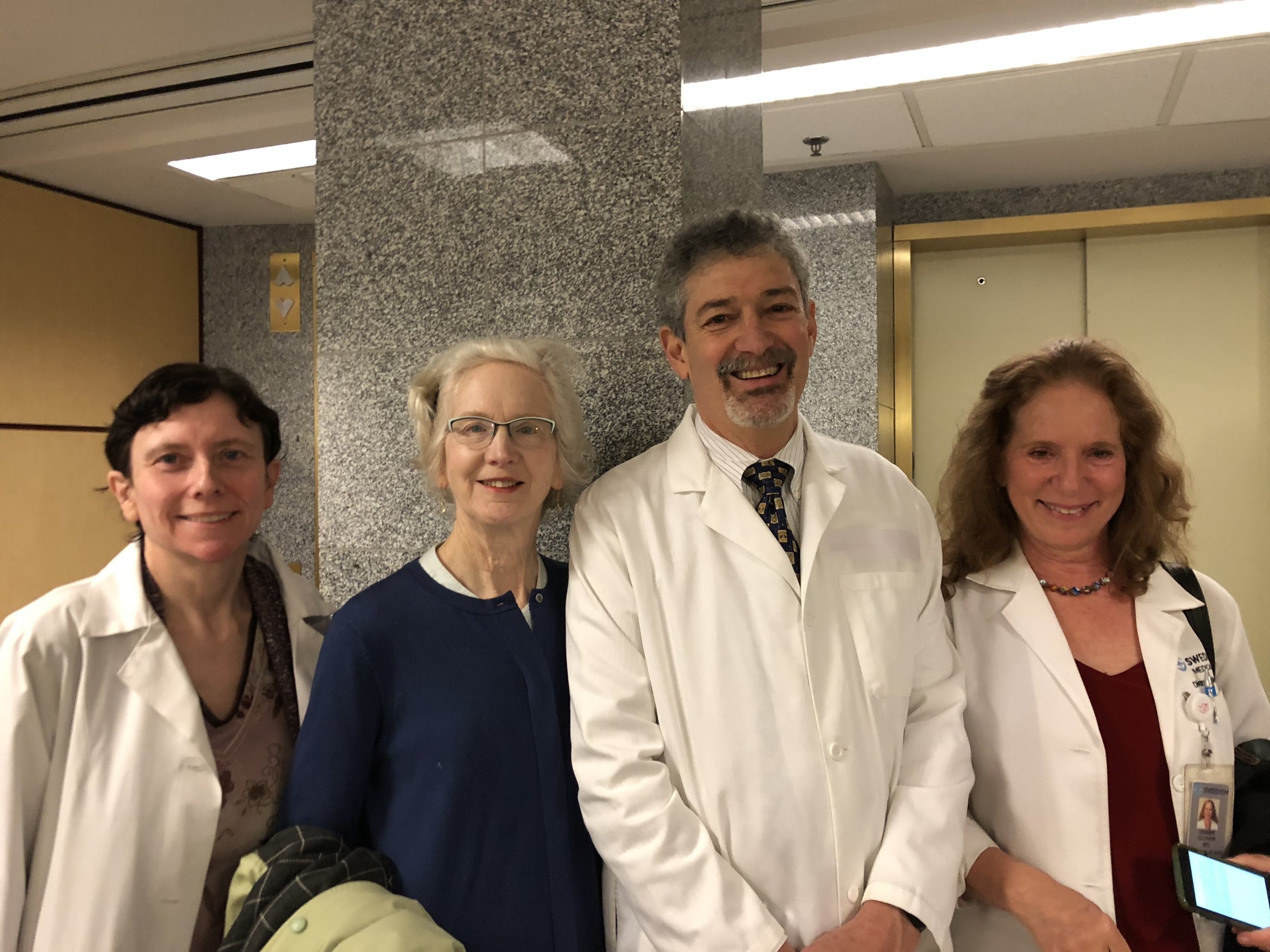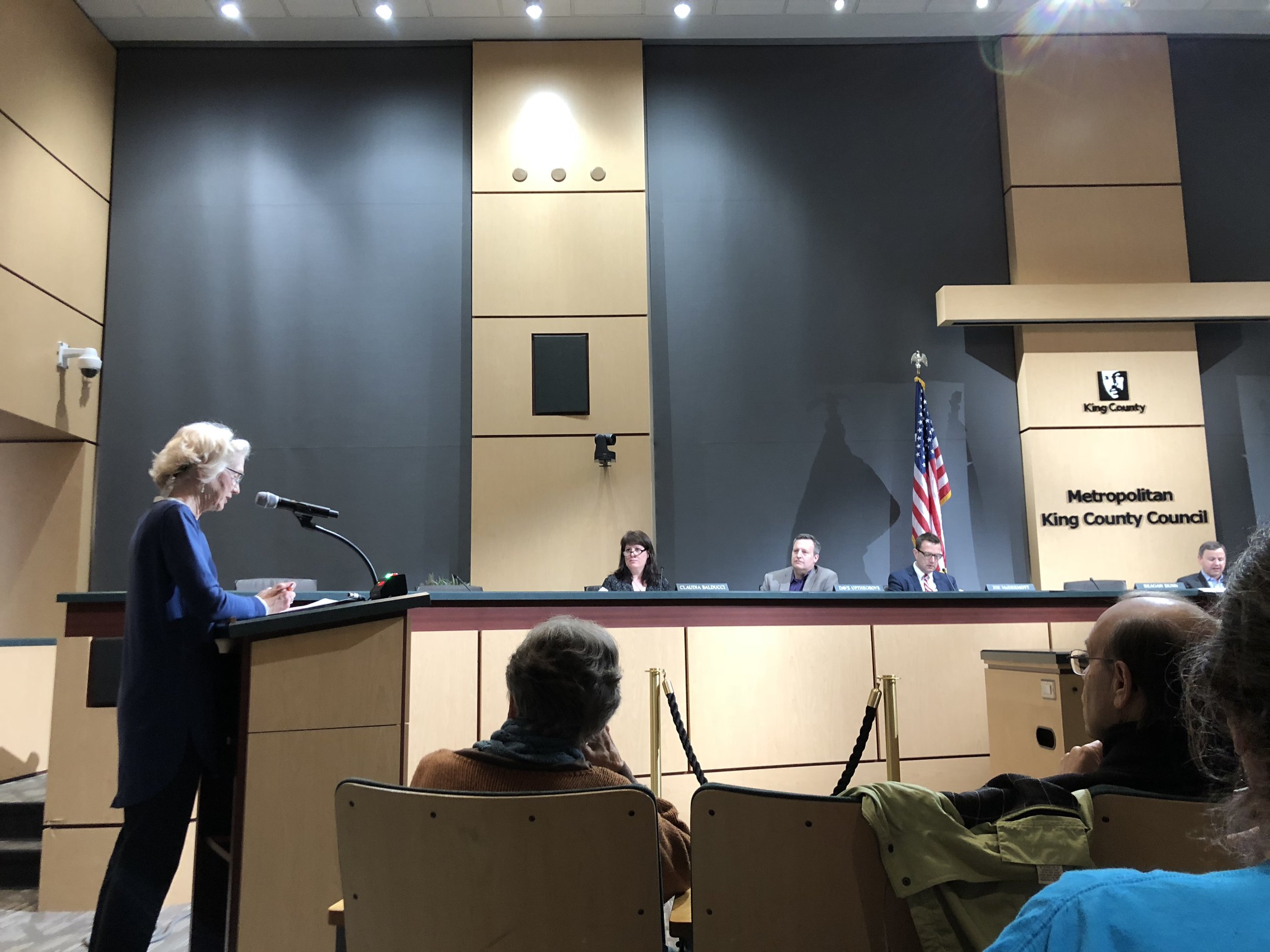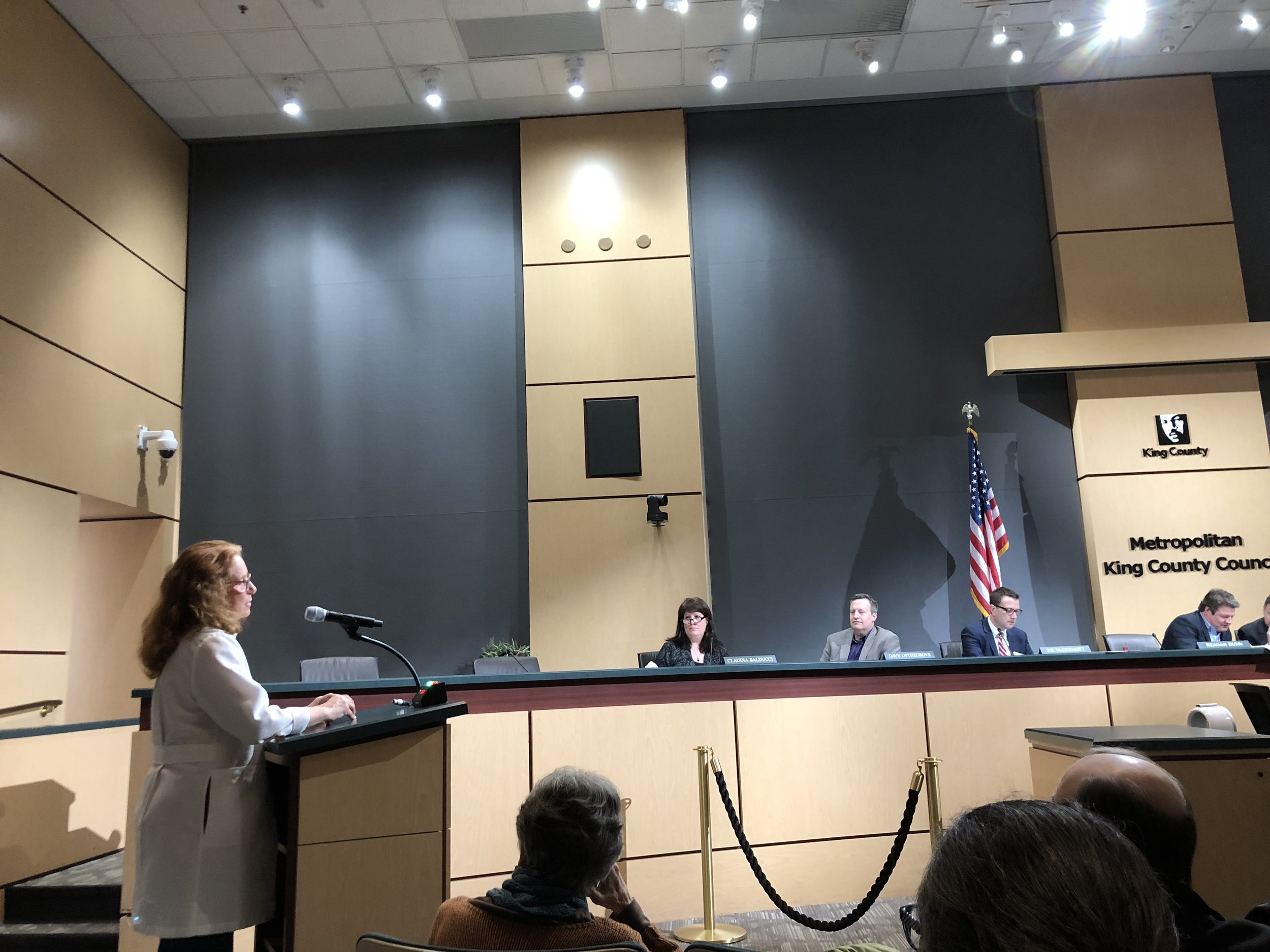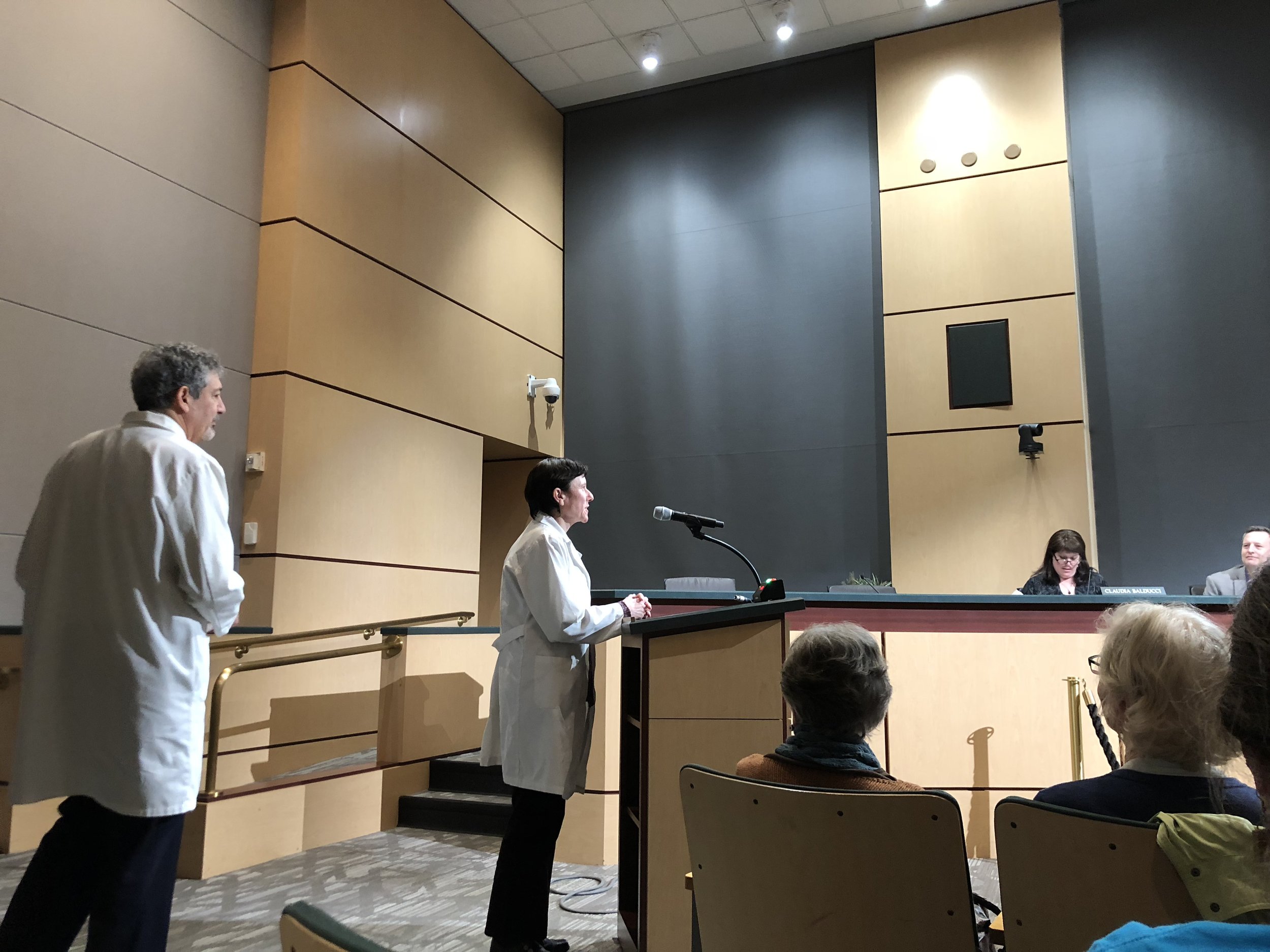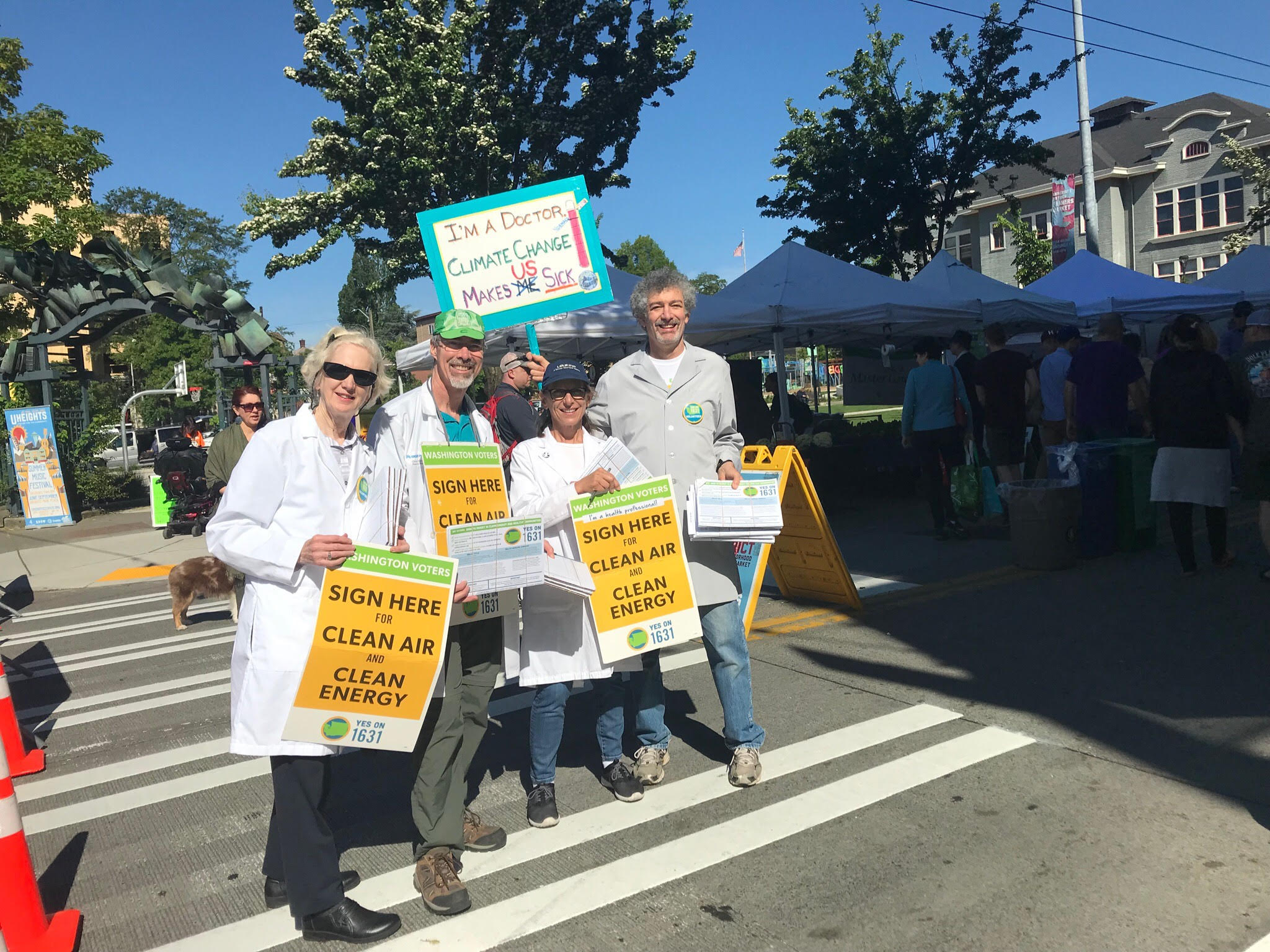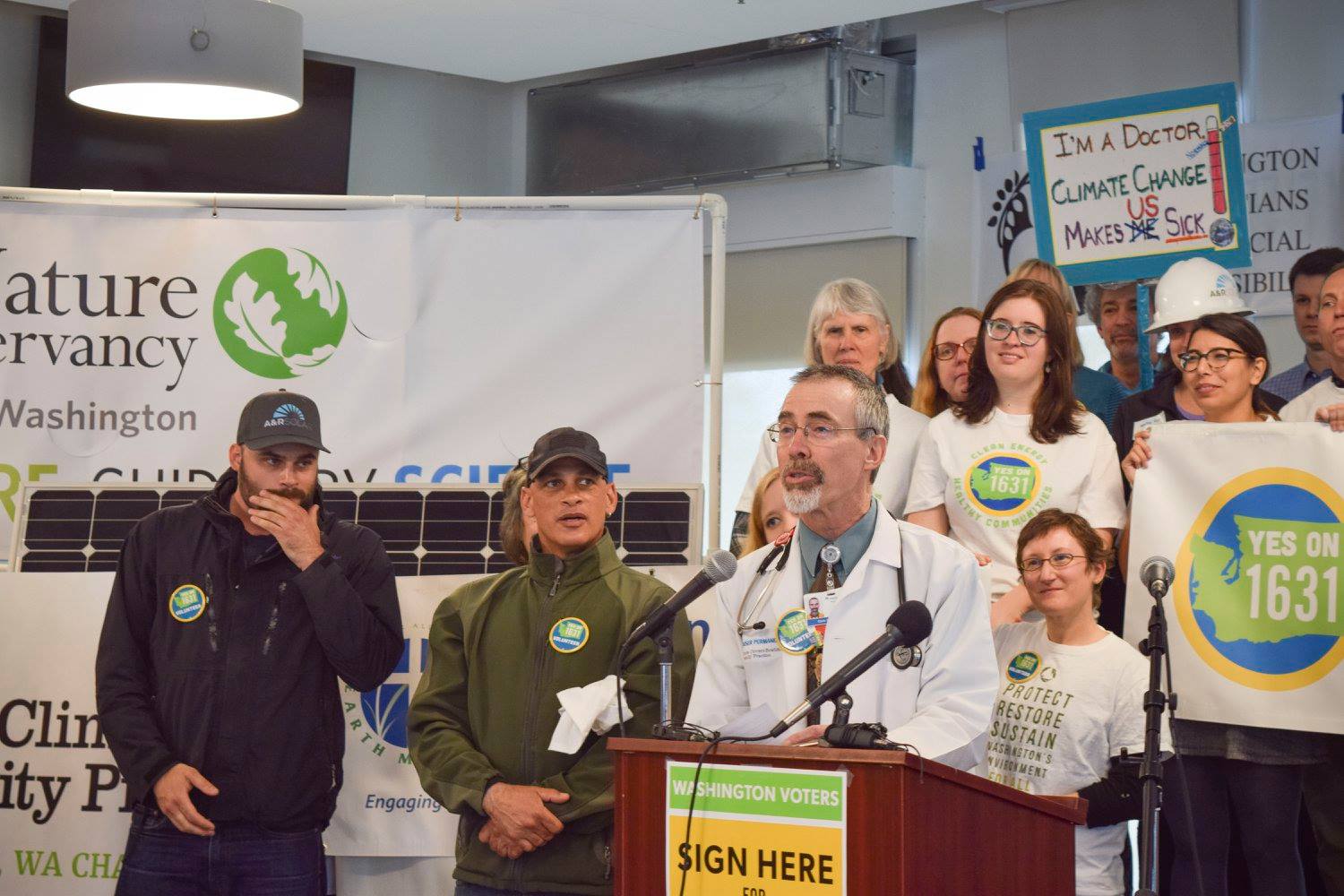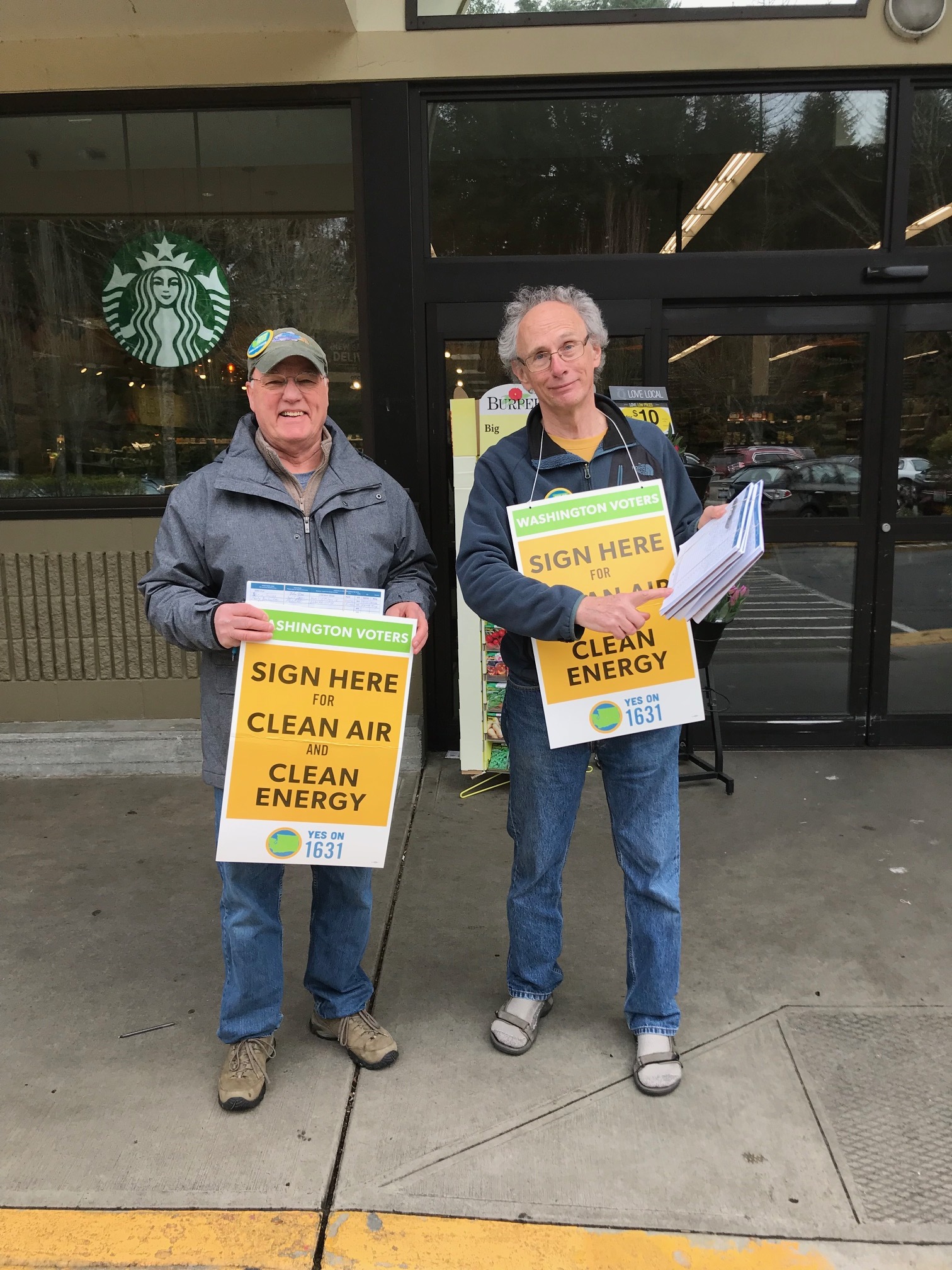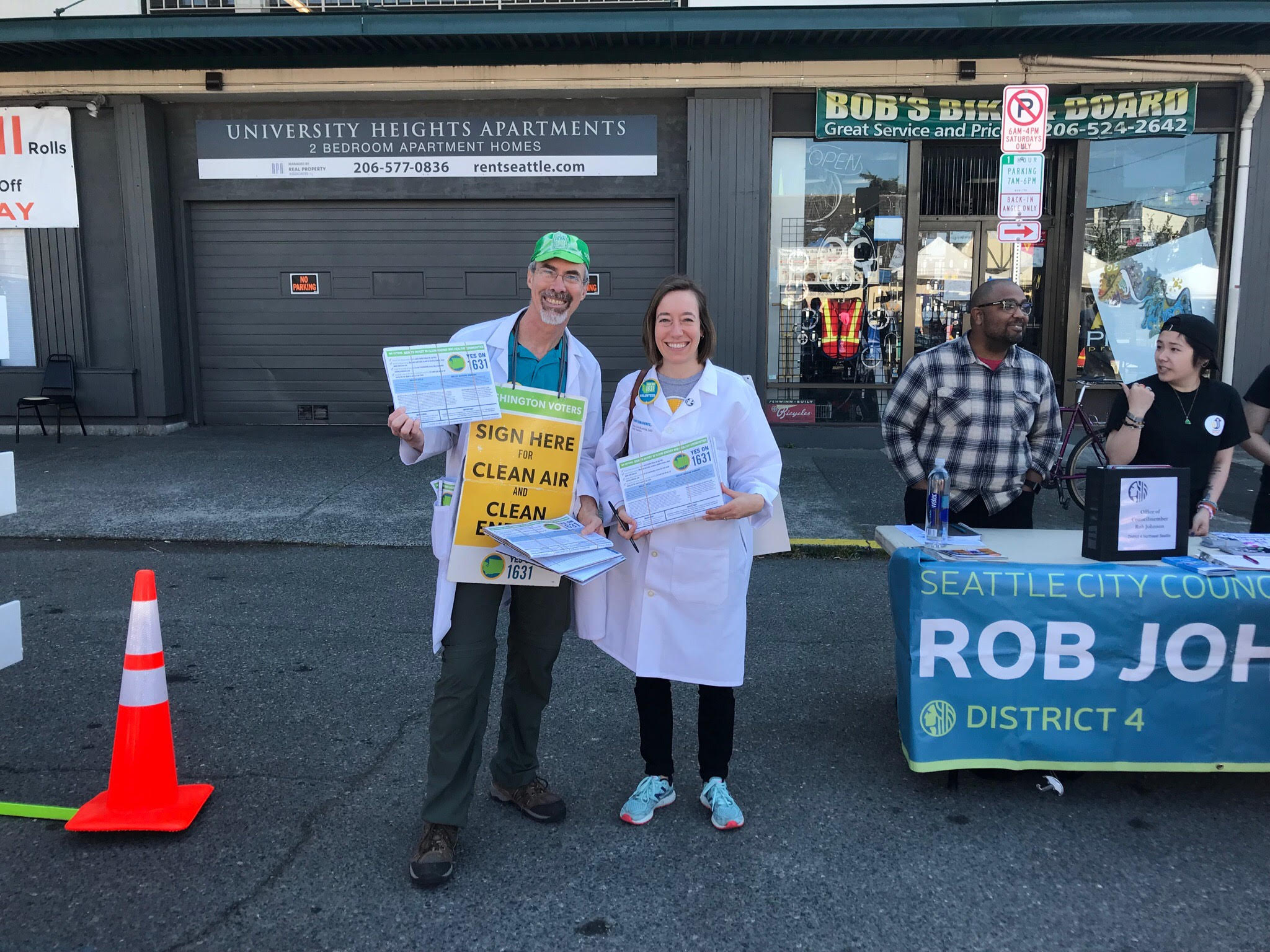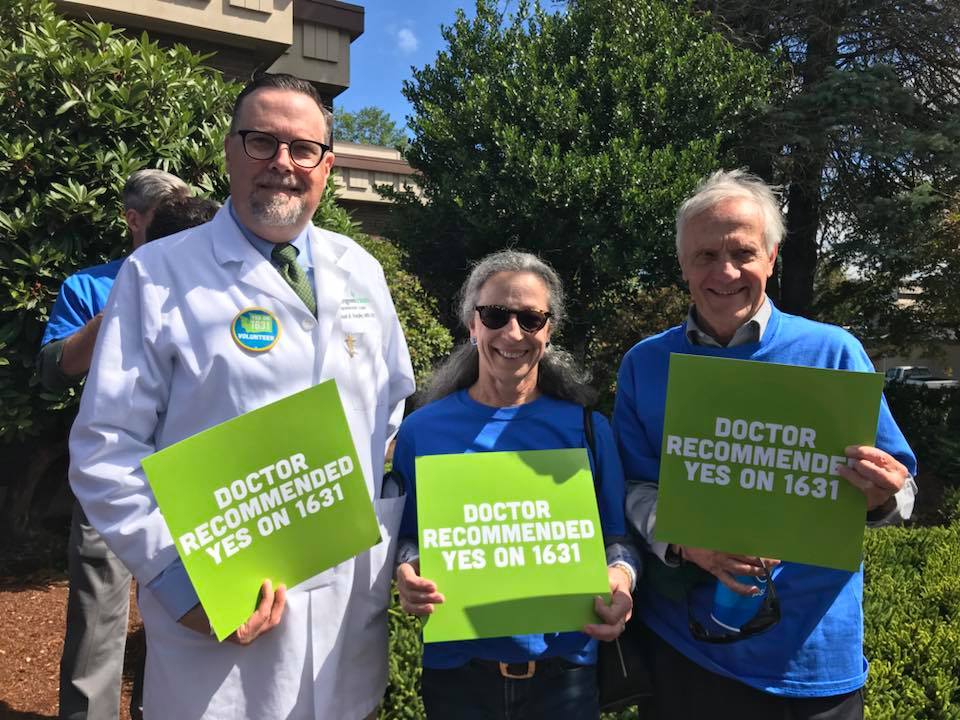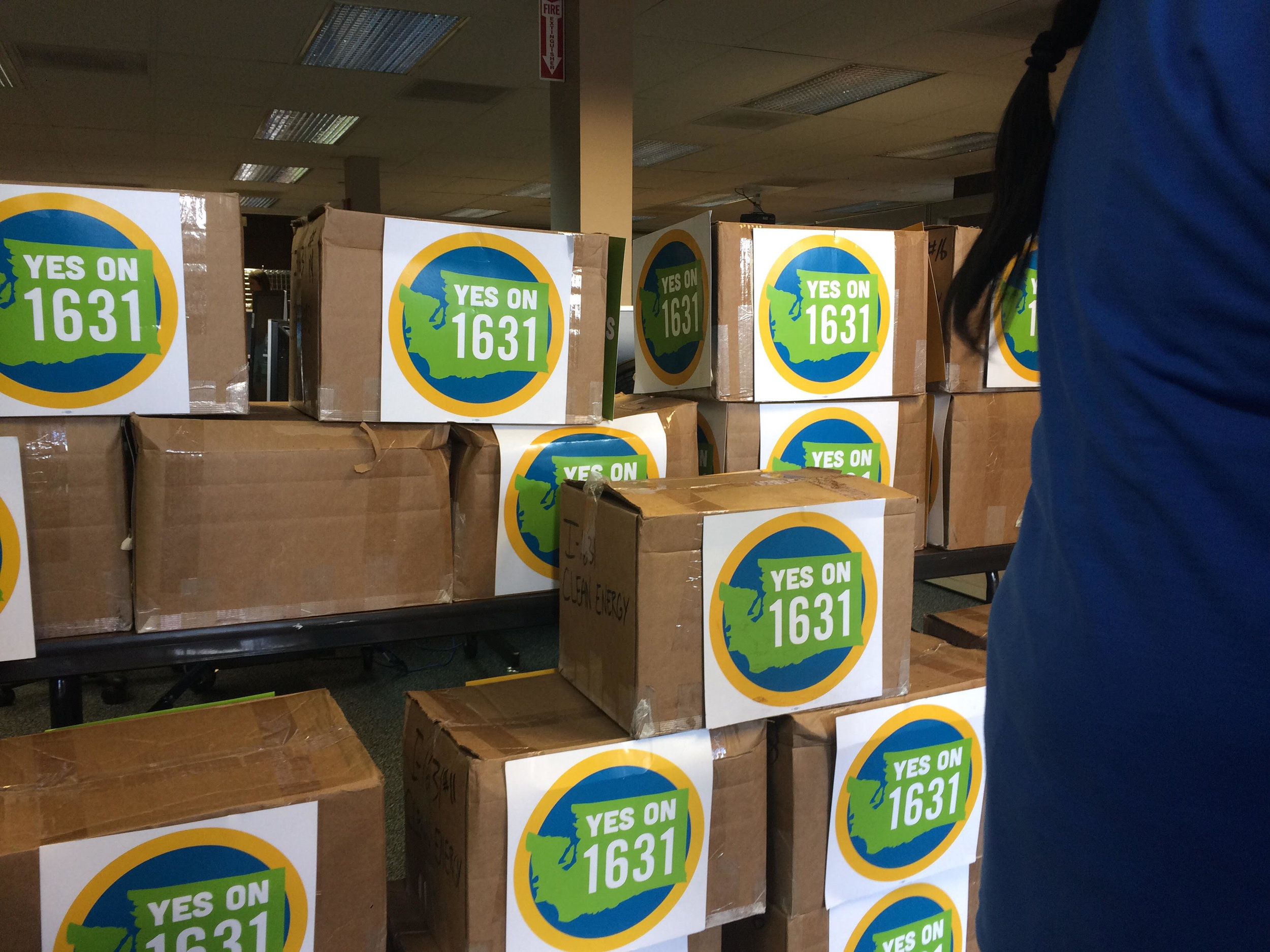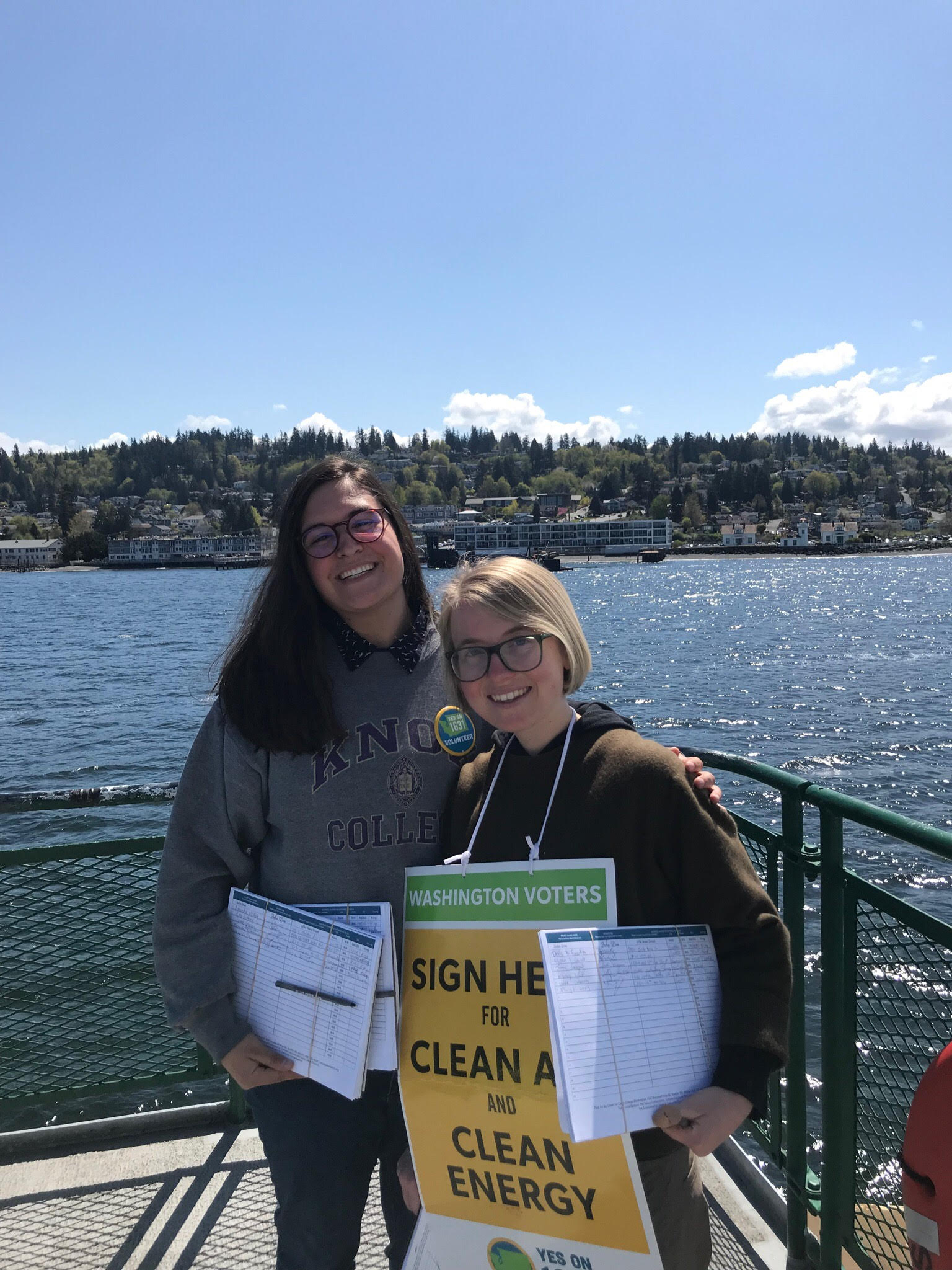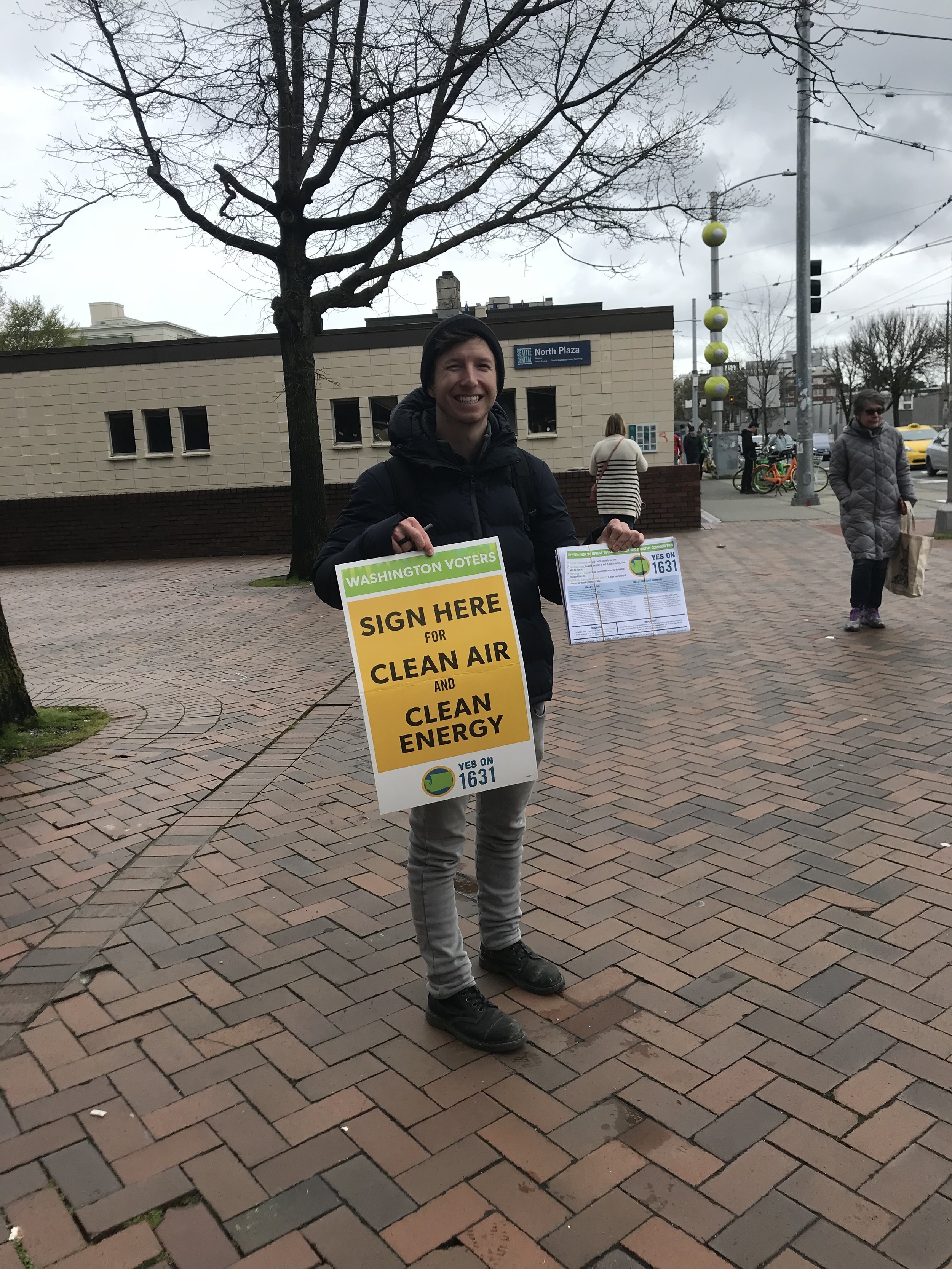Washington Against Nuclear Weapons Calls on State Legislature to Prevent Nuclear War: SJM 8006 Ends up in X-File
Written by Alexander Tufel, Beyond the Bomb UW Chapter
Seattle, Wa — Washington Against Nuclear Weapons (WANW) organized the State Senate to pass Senate Joint Memorial 8006 and in the House of Representatives to pass House Joint Memorial 4008; these memorials requests that the U.S. Congress impose checks and balances on a president’s ability to start a nuclear war. These bills put the the impacts of Nuclear Weapons on people in Washington State on display at the highest level of governance in Washington State.
WANW, a statewide coalition of activists united for a future free of nuclear weapons, hopes to halt the $1.7 trillion overhaul of the U.S. nuclear arsenal, with the long term goal of eliminating all nuclear weapons.
Aside from curtailing a U.S. president’s ability to launch a preemptive strike, the memorial also asks that the president not have unilateral authority to use nuclear weapons, removing US nuclear weapons from hair trigger alert, cancelling the planned $1.7 trillion rebuilding of our nuclear arsenal, and pursuing multilateral, verifiable disarmament with other nuclear powers, leading to the total elimination of all nuclear weapons.
SJM 8006 was drafted with grassroots involvement, has the backing of over 40 organizations statewide, and is co-sponsored by Sens. Bob Hasegawa, Patty Kuderer, Sam Hunt, David Frockt, Jamie Pederson, and Rebecca Saldaña.
On Feb. 22, 2019, SJM 8006 had a public hearing at the Senate State Government, Tribal Relations & Elections Committee, where it passed the rules committee.
Hasegawa opened the hearing by recounting the nuclear weapons experimentation that occurred in the Marshall Islands during the Cold War and his opposition to the current arms nuclear racing of the Trump Administration.
“I think this whole escalation of the nuclear arms race that is kicking into gear again is just as sociopathic and unconscionable as what we did to the those people,” Hasegawa said. “The fear that this brings on of just global annihilation at the disposal of one person … I think needs to be corrected.”
Hasegawa added that given that the Washington State has the highest concentration of nuclear weapons in the country, it would be a “prime target” during a nuclear exchange.
According to Crosscut, 20 miles from Seattle is Naval Base Kitsap, home port to eight out of the fourteen Trident ballistic missile submarines. The base also houses an underground nuclear weapons storage complex. Altogether, the base contains over 1,300 nuclear warheads. This is not only the single largest concentration in the country, but the world.
Nine other activists from various grassroots organizations also gave testimonies, voicing their concerns with U.S. nuclear policy and its current dangerous trajectory.
“For half a century, nuclear weapons have continuously threatened to destroy all life on earth,” Glen Anderson from the Olympia Coalition to Abolish Nuclear Weapons said. “If something were to go haywire right now in our nuclear system, 30 minutes from now all of us could be dead.”
He urged those listening to consider the fact that, while only Congress can officially declare war, no such impediment is placed on the president’s ability to wage nuclear war.
“Let us hope we never have a president who is emotionally unstable,” Anderson said. “Let us hope we never have a president who is reckless and impulsive.”
WPSR Executive Director Laura Skelton mentioned the Trump Administration’s recent withdraw from the Intermediate-Range Nuclear Forces Treaty, which she said could could trigger a new arms race, according to experts. Those living close to deployed nuclear weapons would be most at risk.
“SJM 8006 is an important tool for sending a message to our president and our federal leaders,” Skelton said. “Please pass this measure.”
Given that the Senate failed to hear a vote on SJM 8006 before the cutoff date on March 13, WANW will have to take a second swing at passing this legislation through the legislature next session. The Joint Memorial ended up in what is called the “X-File” where the House and Senate Rules Committees may place bills that will go no further in the legislative process. WANW hopes that Washington State legislators make not only the right choice for the safety and health of their constituents, but the world. Our country’s dangerous and reckless nuclear policy must be changed.
Climate & Health Task Force testifies in support of King County fossil fuel moratorium
On Wednesday, March 13th, four members of WPSR’s Climate & Health Task Force testified to King County Council supporting the six-month ordinance prohibiting new fossil fuel projects! Over 30 people testified in support of the moratorium, which was passed in January.
You can watch the video of their testimonies here.
The physicians included:
Dr. Dianne Glover, a pediatric infectious disease specialist who spoke about her infant patients and how climate change excacerbates wildfire smoke pollution that can significantly harm lung function, especially in babies born prematurely
Dr. Annemarie Dooley, a nephrologist who’s seen increases in heat-related kidney disorders in her patients as our region has experienced higher temperatures in recent summers
Dr. Margaret Kitchell, who spoke about the Lancet Commission’s findings last year that city-level carbon reduction is a key piece in reducing the health consequences of climate change, and
Dr. Ken Lans, who encouraged Council members to mitigate air, water, and climate pollution in their regulatory re-write and hold fossil fuel projects to high environmental review standards.
Thank you to 350 Seattle organizers and all who attended to support this important policy!
WPSR Celebrates 40 Years of Health-Based Advocacy
In 2019 WPSR is celebrating its 40th year! We created this video to highlight just a few of the wonderful people and key events from our first four decades.
Thanks to Ken Lans and Jason Merges for putting this video together!
WPSR supports the HEAL Act: testimony from Dr. Ken Lans
WPSR is proud to support the Healthy Environment for All (HEAL) Act, currently making its way through the legislature in Olympia. These bills (SB 5489 and HB 2009) create a shared definition of environmental justice for state agencies, ensuring that health disparities are reflected in investments, policies, and other programs .
The recently-released Environmental Health Disparities Map, developed by Front & Centered with the University of Washington and the state Department of Health, illustrates that certain Washington communities are disproportionately impacted by air pollution and other environmental indicators that harm health. This new tool reinforces that those suffering from environmental injustice must be the first to shape policy decisions to better ensure that where you live doesn’t dictate your health.
Dr. Ken Lans recently testified to the House Environment Committee in support of the bill. See his testimony and contact your legislator today in support of the HEAL Act!
Ken standing outside the state capitol in Olympia with Front & Centered leaders and staff.
Dear Members of the Senate Ways & Means Committee:
My name is Ken Lans, I’m a retired General Practice Physician and the Past-President of Washington Physicians for Social Responsibility, a non-profit with a 40-year history of health-based advocacy in our state. I’m writing to urge you to pass the Healthy Environment for All Act, SB 5489, out of your committee this week.
As a doctor, I know through my own experience that healthy brains, hearts, and lungs are needed for people to thrive and meet their full potential. Living in an environment free from pollutants and toxins is absolutely critical for everyone’s health and normal development. It is an injustice — one that we can correct — that too many people in certain communities in Washington face worse health impacts because of where they live.
In practical terms, minimizing such exposures requires first being aware of them and taking them into account.
The health-disparities mapping analysis tool, that is part of this legislation, provides an informative, easy-to-use framework for each agency to identify and map out which populations are most vulnerable to a given environmental threat.
These individual exposures don’t act in isolation, they compound on each other. Along with the growing impacts from climate change, these exposures to pollutants further increase the vulnerabilities that medically-sensitive populations already face.
All this severely strains our healthcare system, dramatically raises health care costs, and needlessly siphons away money, resources, and productivity.
I urge the state to make the targeted investments to reduce environmental health disparity that can benefit every Washington community — helping each and every one of us reach the promise of a healthy, happy, and productive life. I urge you to please support the Healthy Environment for All Act, SB 5489.
Thank you for all the work you do to represent us.
For the First Time Since the Cold War, WA Legislature Opposes Nuclear War
People in Washington State find ourselves in a crossfire of the New Nuclear Arms Race, since the presence of nuclear-armed submarines at the Kitsap-Bangor Naval base makes us a prime target in the case of a nuclear exchange. On Friday Feb. 22, for the first time since the end of the Cold War, Washington State Legislators are stepping up to say No More to nuclear proliferation and are standing up to Nuclear War and the New Arms Race.
The risks of international conflict, escalating to include the use of nuclear weapons, have reached levels not seen since the height of the Cold War. Recently renewed conflict between two unpredictable nuclear-armed nations, India and Pakistan threaten global security. The continuing uncertainty surrounding North Korea’s nuclear arsenals; paired with aggressive policies of the Trump administration, which involve a new nuclear arms race combined with irresponsible threats involving nuclear weapons and a total breakdown of existing arms control treaties (such as the Intermediate-Range Nuclear Forces Treaty), have combined to create a frightening and dangerous international environment.
These multiple nuclear crises are finally being addressed with a bold and visionary pair of initiatives in the Washington State Legislature. These Joint Memorials, led by Sen. Hasegawa in the Washington Senate and Rep. Tarleton in the House, propelled by the public, call for the U.S. Congress to “take appropriate steps to move back from the brink of nuclear war.” The Washington Against Nuclear Weapons coalition applauds Sen. Hasegawa and his colleagues for holding a hearing on Senate Joint Memorial 8006 Friday, February 22nd, 1:30 PM, by the Committee on State Government, Tribal Relations and Elections.
Directed at President Trump and the leaders of both houses of Congress, if passed by the Washington Senate (and House), these Memorials would represent very bold statements regarding nuclear dangers addressed to our national leadership from the highest levels of Washington state government. Two similar resolutions were passed by the state of California last year.
SJM 8006 urges that Washington “has a local responsibility to lead a national conversation about reducing and eliminating the threat of nuclear war and revamping our federal strategy.” The Memorial goes on to urge the U.S. to lead a global effort to prevent nuclear war by laying out several policies aimed at reducing the extreme risks from these weapons as well as reducing our arsenals.
The Washington Against Nuclear Weapons coalition, comprised of over 40 organizations across Washington, and Washington Physicians for Social Responsibility, an organization of over 800 health professionals, strongly support passage of these Memorial statements, and commend our elected officials for their foresight and leadership in putting them forward in the 2019 Legislature.
“We are fortunate to have this quality of leadership in our Washington Legislature that is willing to challenge the very dangerous status quo and address these policy issues that ultimately reside at the national level,” said Dr. Bruce Amundson, Vice President of Washington Physicians for Social Responsibility.
Historic fossil fuel prevention ordinance passes in King County!
In a major victory, the King County Council passed an ordinance preventing new fossil fuel facilities in a 6-3 vote. Introduced by Councilmember Dave Upthegrove, the moratorium follows Whatcom County and other Northwest communities with similar policies that protect health and safety and take action on our climate crisis.
WPSR members worked closely with 350 Seattle and other groups, including the Sierra Club and the Power Past Fracked Gas coalition, in support of this historic ordinance. We’re grateful for 350 Seattle and Councilmember Upthegrove’s leadership to move this issue forward! Thanks especially to Jess Wallach, who first approached us about getting involved in this a year ago.
This moratorium is a win for health. WPSR published a research report making the case for it, sent letters and made calls to Council members, two of our physicians, Dr. Ken Lans and infectious disease pediatrician Dr. Dianne Glover, testified. Dr. Lans spoke at a press conference just before the vote. Read his remarks below.
—
Good morning. My name is Ken Lans. I’m a retired General Practice physician, the past-president of Washington Physicians for Social Responsibility, and the father of an 18 year-old son.
In a couple hours, I will be testifying before the King County Council, urging them to protect the health and safety of this county’s citizens by passing the Fossil Free KC ordinance.
As a physician, I know that adding major fossil fuel infrastructure puts more and more people’s health and safety at increased risk. Fires and explosions, while rare, are still much too common and, when they do occur, can be catastrophic, like the 2016 Greenwood gas explosion. Add to that the known risks of adverse health effects that result from exposures during fuel extraction, processing, and transportation.
There are also huge health impacts from burning those fossil fuels. Our reliance on these fuels means we’re dumping enormous amounts of global-warming causing CO2 and health-harming gases and particulate matter directly into the air that we, and our children, need to breath. Most in the medical community now see climate change as the biggest, most serious threat to our public health.
We know from the medical evidence, and from seeing patients in our everyday practices, that air pollution and climate change — human-caused climate change — hurt real people right now. All of us can be harmed, but poorer populations and communities of color are even more heavily impacted, as they tend to live in areas with higher levels of pollution and toxic air. Numerous health studies show that, because of increased exposure to pollution, they tend to die younger and suffer more ill-health throughout their lives. That’s true here in Seattle (as in many other places) where, largely due to localized pollution, residents of the Georgetown, South Park, and Beacon Hill neighborhoods have a life expectancy eight years shorter than the city’s average.
The Intergovernmental Panel on Climate Change, our own government’s National Climate Assessment, and the World Health Organization all recently reported findings that climate change is accelerating even more quickly than predicted — and added loud warnings of profound climate change-related dangers to human health if we continue on our current path of greenhouse gas emissions.
As the experts also so clearly lay out, the longer we wait to act, the more fossil fuel we continue to burn, and the more carbon dioxide and other pollutants we pour into the air — the more the earth will warm, the more extreme the climate will become, the more air quality will worsen, and the more dire and widespread the impacts and harms on people will be. To put it bluntly, the prognosis — without a prompt change in course — is very bad.
We have about a decade to greatly accelerate our transition to clean energy. But while the time to act is short, it’s still in our power to make the wise choices that get us off this unsustainable trajectory.
The grave dangers posed by climate change mean we should be doing everything we can to reduce our fossil fuel use, rather than enabling it. The Fossil Free KC ordinance, which will stop expensive, unwise and health-damaging investments in major fossil fuel infrastructure, is an important step in the right direction.
To protect everyone’s health, we urgently need to begin transitioning off our heavy and harmful reliance on fossil fuels. This transition to cleaner sources of energy will help drive down emissions, reduce levels of pollution, and bring enormous and immediate health benefits and health cost savings.
That is why, as both a health professional and a father, I am urging the King County Council to take this bold step forward to protect the health and safety of this county’s citizens and pass the Fossil Free KC ordinance.
Each and every one of us has both the power and the responsibility to ensure that our children and grandchildren will inherit a safe and livable planet, where they can thrive and lead full, healthy, and productive lives.
Dr. Ken Lans speaking at a rally in support of the moratorium.
"Preventing major fossil fuel projects protects health" - Gerald Cufley, MD
Gerald Cufley, MD, makes the case for a moratorium on new major fossil fuel infrastructure.
This letter was written by Dr. Gerald Cufley of WPSR’s Climate & Health Task Force.
On January 28th, King County Leadership can take a bold step forward in providing for the health and safety of the county’s citizens by voting in favor of an ordinance preventing new fossil fuel infrastructure. Fossil fuels not only present risks of explosions and fires but negatively affect human health. These adverse health effects that result from exposure during the extraction, processing, transportation and use of fossil fuels have been well documented and include chronic respiratory diseases, cancers, and birth defects. Cardiovascular events such as heart attacks and strokes are known to be associated with areas of air pollution. On a broader scale indirect health effects caused by global warming and related extreme weather events add to the list, injuries, heat stroke, certain infectious diseases due to the northward migration of vectors carrying diseases, malnutrition, starvation and public health risks associated with human migration.
Whatcom County and Portland, OR have passed similar measures to protect their citizens from fossil fuel projects. King County can and should be next.
Efforts to place a methanol production facility in Kalama, Washington provide a good example of why King County must take action to ensure the health and safety of its citizens. The Kalama project is designed to convert methane (natural gas) to methanol presumably to be shipped to Asia for use in the production of plastics. The amount of methane required would be extraordinary, an amount that would heat 1.6 million homes and would require a dramatic expansion of currently available natural gas pipeline capacity. Such an expansion would most likely occur along the Northwest Pipeline System running north south along a right of way through the center of King County and would put these previously rural but now densely populated areas of the county at increased risks of fire and explosion. Beyond these more obvious risks are the increase in health risks associated with the path of natural gas from extraction to end user and the overarching health risks associated with global warming. Such health risks could be compounded by the decades long use of expanded infrastructure originally put in place for the purpose of producing plastic but potentially used for providing natural gas for electricity production, heating, and industry.
Natural gas is not a bridge fuel but rather the lesser of two evils. Yes, the burning of natural gas produces less carbon dioxide per unit of captured energy when compared to coal and contains less impurities, but the savings in carbon dioxide emissions is largely lost when leakage of natural gas, so called fugitive gas, from drilling sites, pipelines, compressor stations and refining facilities is taken into account. Methane is 86 times more potent than carbon dioxide as a GHG. The environmental scar left behind by extracting natural gas does not end with the atmosphere. The fracking process uses large amount of water and leaves behind toxic materials.
What must be an enormous cost to society of supporting the ills that arise in the wake of fossil fuel use is not easy to calculate. The foremost medical journal, The Lancet, calls climate change the biggest public health threat of our lifetime. A special report on climate change and health released in November reminded us that low income and communities of color are often most impacted.
Certainly, fossil fuel exploitation has given rise to an unprecedented standard of living, but alternative energy sources, including wind and solar, exist which are cost competitive and avoid the health risks and global warming associated with fossil fuel use. The leadership of King County can do its citizens a service by fulfilling its constitutional obligation of assuring the health and safety of the people of King County and at the same time set an example for others to follow in the effort to secure an endurable future for the generations to come. WPSR in the strongest terms, urges King County Leadership to support a moratorium on new fossil fuel projects.
Gerald A Cufley, MD
Climate & Health Task Force
Washington Physicians for Social Responsibility
The health and safety imperative of preventing new fossil fuel projects
WPSR has published a 14-page report making the health and safety case for a moratorium on new major fossil fuel infrastructure in King County. Read it here.
Over the past decade, Northwest communities have successfully fought back against fossil fuel development in their backyards. As the climate crisis deepens and coal, oil, and gas industry interest continue to eye Washington and Oregon for new projects, cities and counties are taking proactive steps to prevent this infrastructure from being allowed for in the first place. On January 28th, King County can be next. Councilmember Dave Upthegrove is set to introduce a moratorium on these harmful projects.
The risks to health and safety posed by fossil fuel infrastructure are well documented. Pipelines carrying oil and gas, compressor stations, storage tanks, and vessel and rail transport sites have been shown to be susceptible to combustion, fire hazard, and releases of toxic pollution in instances of leaks and spills. Shipping and storing coal and oil poses its own unique risks.
While King County does not have any oil refineries or coal export facilities, it is home to quite a large amount of fossil fuel infrastructure and like many communities in our region, is at risk of fossil fuel expansion. Of primary concern are pipelines and trains carrying oil and gas through the region. Coal is also of concern; a coal mine was recently proposed to re-open in Black Diamond.
In recent history, the vulnerability of King County residents to the risks associated with infrastructure carrying and storing fossil fuel products has become apparent. Incidents like the 2016 Greenwood Gas explosion and the 2014 Interbay oil train derailment in Seattle are a reminder that large volumes of fossil fuels are being transported through our neighborhoods and right under our feet. A full breakdown of existing pipelines and fossil fuel projects were mapped by 350 Seattle members in 2018 (you can find the map here).
In Whatcom County, Tacoma, Vancouver, Aberdeen, Hoquiam, Portland, Oregon and Baltimore, MD local governments have responded to these risks through protective land use planning. Successful legislation has updated zoning codes to prohibit new significant fossil fuel development. Adapting these strategies to secondary and temporary infrastructure, including pipeline expansions and the local permits relevant to fossil fuel infrastructure construction and ongoing operation, offers another tool to protect local residents from the well-documented health and safety risks posed by fossil fuel infrastructure.
Why now?
The most significant fossil fuel threat to King County is the expansion of gas infrastructure to meet the demand created by major gas projects proposed for southwest WA, such as the Kalama methanol refinery.
Dr. Margaret Kitchell, a physician on WPSR’s Climate & Health Task Force, speaks about the health and safety risks of the methanol refinery at a rally.
The Kalama refinery alone would use more than one-third of Washington state’s current gas consumption, meaning that should it come online the Kalama refinery would overtax current infrastructure. While proponents of the refinery have presented a plan to ‘bridge the gap’ in gas supplies, this plan is short-term and ultimately depends on the construction of a new pipeline to augment the current Williams Northwest system. This pipeline expansion would most likely happen in the existing pipeline corridor that runs through King County. But King County faces gas threats from more than just Kalama.
Between 2012 and 2017 alone, the Northwest has seen proposals for six major new gas pipelines and in the 2016 Gas Outlook, the NW Gas Association states that a new pipeline is “only a matter of time”.
King County is at also risk from piecemeal expansion of existing gas infrastructure. ‘Safety upgrades’ for aging pipelines often double as opportunities to significantly increase pipe diameter and expand gas capacity. The current North Seattle lateral expansion project is an example of this: A 2012 inspection found signs of cracking and a leak in the 60-year old North Seattle Lateral gas pipeline that runs along the King-Snohomish border. Permitting is underway to replace six miles of the damaged eight-inch diameter pipeline with a new 20 inch diameter pipeline – quietly increasing gas delivery capacity by 63% and ensuring that the pipeline can stay in service for another 60 years. With this ‘safety upgrade’, the pipeline will have increased WA’s annual greenhouse gas pollution by 3%, or three million metric tons per year (that’s almost as much as the entire city of Seattle).
Of lesser but still significant risk is the possibility of fossil fuel infrastructure expansion near the Port of Seattle. This deepwater port has been the site of multiple proposed fossil fuel infrastructure projects, most recently the 2015 proposal for a terminal to support Arctic drilling operations. While the project proponent, Royal Dutch Shell, retracted the plan following broad opposition, it demonstrated the region’s vulnerability to new fossil fuel projects.
Our health, climate, and fossil fuel extraction
Climate change is already negatively impacting health, both in King County and around the globe. The US Climate Assessment released in November 2018 found that asthma exacerbation, extreme-heat related illness, and smoke pollution resulting from wildfires will worsen health outcomes for people living in the Pacific Northwest as climate change intensifies. Adding to these health concerns, the Washington State Department of Health reports that climate change is likely to increase rates of heat related illnesses; respiratory illness; vector-, water-, and food-borne diseases; and mental health stress. Indeed, deaths caused by extreme heat in King County rose 10% between 1990 and 2010, and our region can expect to see more frequent and extreme heat waves as the climate crisis intensifies Climate change-exacerbated wildfires across our region in the summer of 2018 brought the region its worst air quality in decades.
These health burdens are not affecting King County residents equally. Lower-income and communities of color in Washington are already bearing an outsized health burden. A 2018 report from Front & Centered and the University of Washington identified flood risk, significantly poorer air quality, and higher rates of chronic conditions made worsened by climate change and pollution impacts (such as asthma and heart disease) as existing inequities in the climate change burden our region faces. Neighborhoods in South Seattle that lie within existing pipeline routes, including the Olympic Oil Pipeline, already face more pollution and health disparities than other parts of the city.
Fossil fuel infrastructure is fueling the climate crisis, which the World Health Organization and major medical journals have declared the greatest public health threat of our time.Scientists agree that fossil fuel extraction plays a central part in our climate crisis. While extracting gas, oil, and coal contributes to these climate change-related health burdens, the infrastructure required for their production and transport also poses significant and numerous risks.
“We must prevent what we cannot cure”
Nurses and public health professionals testify in support of regulations limiting new fossil fuel projects in Tacoma in November, 2018.
Limiting fossil fuel development can yield major health and climate benefits by curbing harmful air pollution and greenhouse gas emissions associated with burning and transporting coal, oil and gas. Local governments and regulators can employ protective land use planning to limit new fossil fuel infrastructure and enhance safety of existing infrastructure.
Called by the prevention principle, physicians and nurses have been a key voice in campaigns for fossil fuel infrastructure moratoriums in Tacoma, WA and Portland. Washington Physicians for Social Responsibility strongly encourages King County leaders to join the list of communities employing these powerful land use strategies to protect health and safety from these projects.
WHO, Lancet Reports Confirm It: Tackling Climate Change Improves Public Health
“Climate change is killing our patients,” WPSR physicians write op-ed in Seattle Times.
Image credit: Gabriel Campanario / The Seattle Times
New reports from The Lancet medical journal, a World Health Organization study, and the recently published US Climate Assessment confirm what Washington healthcare providers are already seeing: climate change is hurting our patients.
Both reports detail striking health consequences of climate change with impacts in the Pacific Northwest. They find that actions to reduce global warming emissions will dramatically benefit health, from reducing air pollution to protecting those at risk of disease. “From the devastating smoke pollution caused by wildfires this year this summer to extreme heat stress, our patients are suffering the health consequences of climate change” said Dr. Mark Vossler, a cardiologist in Kirkland, Washington and Chair of the Washington Physicians for Social Responsibility (WPSR) Climate & Health Task Force. “The findings of this report demonstrate the need for physicians and nurses to get out of the exam room and in to offices of our legislators.”
Health professionals in Washington are already mobilized to take action on climate change. An unprecedented medical coalition representing thousands of Washington physicians and nurses endorsed the carbon fee ballot initiative, I-1631. Medical providers have been key players in coalitions that have successfully resisted construction of new fossil fuel infrastructure and will advocate for statewide emissions-reducing policies next year in Olympia.
“As physicians called to prevent what we cannot cure, this report confirms that it is our duty to do everything we can to ensure a livable future for our communities and our patients,” said Dr. Anita Peñuelas, family physician and WPSR Climate & Health Task Force member.
“As a physician, I and my colleagues know from the medical evidence and from seeing patients in our everyday practices, that air pollution and climate change — human-caused climate change — hurt real people right now,” said Dr. Ken Lans, WPSR President. “To protect everyone’s health, we must stop using the atmosphere as an open sewer, dumping huge amounts of pollution right into the air that we, and our children, need to breath.”
I-1631: Gratitude and Reflections
This was a big week…nay, year!...for WPSR and our work to address climate change and its health effects. We were an early and strong supporter and helped write Initiative 1631, a climate justice policy that would have put a fee on greenhouse gas pollution and invested in clean energy projects in Washington communities. As we all get some rest and process Tuesday’s results, we wanted to share with you our reflections.
What we didn’t do:
Unfortunately, we lost this one. We didn’t overcome the more than $31 million that the oil industry spent on an unprecedented misinformation campaign to defeat this measure. That's a bitter pill to swallow, but now let’s get on with the good news.
What we did do:
We built a major climate justice movement in WA, one whose strength drew an enormous backlash from the oil industry. Over the last several years, we have worked alongside an amazing diversity of stakeholders, including environmentalists, labor unions, faith leaders, communities of color, businesses, and tribal nations. We established a vision for addressing climate change while especially protecting the most vulnerable among us. Our efforts have inspired people far beyond our little corner of the country to contemplate putting a price on climate pollution.
WPSR in particular proved that a relatively small group of intensely dedicate people can have an outsized impact. WPSR members gathered over 9,000 signatures to get Initiative 1631 on the ballot. We knocked on thousands of doors and made hundreds of calls to talk with voters about why we support I-1631. Our physicians appeared in campaign ads; nurses appeared in television interviews; and public health researchers wrote op-eds.
WPSR also strengthened our relationships with a number of leading organizations and individuals within Washington’s medical community. We sought endorsements from a number of local, state, and national organizations, and many of them stepped up to confront the threat that climate change poses to our health. Organizations representing thousands of health professionals, including Washington State Medical Association and Virginia Mason, endorsed the initiative – for which we are so grateful!
WPSR members did not sit on the sidelines and hope for the best, nor did they feel their work was done after endorsing the initiative. We gave it our all, signaling to the public that climate change is very much a health issue.
Thank you.
While the results of this week’s election were not a home run for climate justice, there are so many things to be grateful for. Working with many of you on this campaign has been a joy for us. The dedication of our members to the cause of climate justice has been truly inspiring.
When WPSR first joined the Alliance for Jobs and Clean Energy four years ago, we could not have guessed that our physicians and nurses would be gathering signatures at farmers markets and doorbelling in their white coats. We could not have imagined that several WPSR physicians would be among the campaign volunteers who gathered the most signatures to get I-1631 on the ballot, and who knocked on the most doors to talk to voters.
You came to rallies and held signs. You spoke at press conferences, some of you for the very first time. You wrote letters to your local papers. You initiated conversations with your coworkers during lunch. You entreated your workplaces to endorse the initiative. You hosted informational events in your home.
We have heard many times from our partners in the Alliance for Jobs and Clean Energy that the health community “punched above its weight” in this campaign. Thank you!
What we must do now:
We have built such an amazing network of health professionals pressing for action. We must build on this momentum, and advocate for policies that will protect health from climate change. We will advocate for bills during the upcoming legislative session. We will work with local health professionals to support community-based initiatives to transition to clean, renewable energy. We will educate medical students about the links between climate change and health. We will train health professionals to understand and amplify the health co-benefits of acting on climate change.
What we must not do is give up. We do not have time to wait for others to act. We must fuel our sense of urgency into continued education and advocacy.
Our patients are depending on us. Our communities are depending on us. Our grandchildren are depending on us.
Thank you for your hard work and your support during this campaign.
With love and hope,
Laura Skelton, Executive Director
Sarah Cornett, Climate Program Organizer
Ken Lans, MD, WPSR President
Mark Vossler, MD, Co-Chair of WPSR Climate & Health Task Force
Nate Matthews-Trigg, MPH, on Climate and Health
Last month, WPSR Climate & Health Task Force member Nate Matthews-Trigg led a webinar for youth activists with the organization Our Climate on climate change as a health issue. The presentation focuses on understanding the health impacts of climate change, and how activists can use the topic of climate change and health to promote mitigation and adaptation actions, policies, or general awareness.
Close to 1.5 hours in length, the presentation is a helpful resource for new and seasoned advocates alike. The audience should already have a basic understanding of climate change. The discussion questions at the end can be used to facilitate small group discussions or act as writing prompts.
Feel free to use, share, or alter this presentation, which you can find on the “Climate and Health Advocacy Resources” page on our website. However, do give credit to Nathaniel Matthews-Trigg!
"Let's go electric!"
On July 19th, WPSR Executive Director Laura Skelton joined leaders from Environment Washington, Sierra Club, Washington PIRG Foundation, King County Executive Dow Constantine and King County Metro Transit in recognizing the County's commitment to bus electrification by 2040.
We know that transit electrification yields immediate health and climate benefits, and we're grateful for the County's leadership. See Laura's remarks below:
I’m here on behalf of hundreds of physicians, nurses, and other health professionals in WA Physicians for Social Responsibility who recognize climate change as a growing health crisis. One of the best ways we can take care of people and patients is to champion policies that fight climate change and ensure a livable environment.
King County's electrification of public transit is an important means both of addressing climate change and protecting health. Transitioning to electric vehicles will help our communities realize immediate health benefits.
Pollution from vehicle exhaust has been linked to cancers, respiratory ailments, cardiovascular disease, and premature death. Diesel exhaust accounts for 78% of the potential cancer risk from all air toxics in the Puget Sound area – and a third of that diesel exhaust comes from on-road vehicles.
Instead of diesel, let’s go electric!
Bus electrification will especially help protect the more than 600,000 Washingtonians who suffer from asthma. Not surprisingly, asthma rates and other respiratory ailments are higher in communities along heavy transit corridors.
Because low-income residents and communities of color are more likely to live along these corridors, they bear a disproportionate burden of the consequences of our fossil fuel use.
To fight this injustice, let’s go electric!
Moving to electric buses will immediately result in cleaner air, protecting some of the most vulnerable members of our communities. It will also protect health long-term, by mitigating further climate change. This is truly a win-win.
We are grateful for King County’s leadership in transit electrification. In order to protect our climate and the health of Washingtonians, we hope that more communities will follow King County's lead. Let’s go electric!
Saying "Yes" to Clean Air and Clean Energy
You did it! On Monday, July 2nd, WPSR members and staff joined our partners in the Alliance for Jobs and Clean Energy coalition in Olympia to turn in 377,000 signatures to get Initiative 1631 ("Clean Air, Clean Energy") on the ballot. We are honored to play a leading role and represent the health voice in this unprecedented coalition of tribal nations, communities of color, labor unions, and environmental groups working to improve the lives and health of all Washingtonians.
Over the past four months, volunteers gathered thousands of signatures for Clean Air and Clean Energy. From Farmers Markets, to rainy light rail stops, to retirement home lobbies and gatherings of friends, health activists were unstoppable. Together, WPSR members gathered over 8,368 signatures. We are amazed by your efforts and activism - thank you for helping us get here.
At the signature turn-in press conference, Dr. Mark Vossler (cardiologist and Chair of WPSR’s Climate & Health Task Force) gave the following remarks. He was joined on the speakers list by WPSR intern Jade Lauw, also a fellow with the youth advocacy organization Our Climate. Mark gathered nearly 1,000 signatures and played a leading role in the East King County signature drive campaign. We’re inspired by his efforts and those of our entire team.
Supporting I-1631 through health-based advocacy is a priority for WPSR’s Climate & Health Task Force. As we gear up for November, we’re getting ready to speak loudly and often about the imperative of putting a price on carbon pollution, supporting communities most vulnerable to climate change, and investing in clean energy. From talking to friends and neighbors, to writing op-eds and letters to the editor, there will be countless ways to support this critical effort.
Dr. Mark Vossler's Remarks at I-1631 Signature Turn-in Press Conference
“Clean Air! Clean Energy! What’s not to like?” I remember my first signature gathered in the campaign. The woman who signed on a rainy April day outside PCC said those words to me while she grabbed the board and then about to sign asked, “What’s this about?” As I briefly explained the proposal she said, “You had me at clean air.” That experience has buoyed me through the rest of the campaign.
I joined Washington Physicians for Social Responsibility to work on preventing that which we cannot cure. I took time away from my medical practice and my family to volunteer for Yes on 1631 because I know that climate pollution is affecting real people right now. I committed every free moment I had to the effort because there was nothing else I could have done over the past three months that would have had a greater impact on the health of our community. I know that the air pollutant co-riders with carbon are affecting people in Washington right now. I’ve read the studies showing increased heart attacks and strokes related to “bad air days." I’ve seen my own patients coming to clinic with worse heart failure and worse asthma when the particulate counts are up.
The health impacts of our continued addiction to fossil fuels hit the most vulnerable the hardest, from little kids with asthma to the frail elderly with heat stroke to residents of impoverished low lying coastal villages with water supplies flooded with sewage. Yet these vulnerable communities have done the very least to contribute to the problem. It is repulsively immoral that our nation continues to promote interests of dirty energy barons on the backs of the sick, the infirm, the young, the old and the poor.
We aren’t willing to let the naysayers hold us back. I feel so privileged to be able to work with so many amazing diverse groups who are ready to stand up for their communities. This coalition truly represents all of Washington because having clean air and a health place to live affects all of us.
The health of people in our community is NOT a special interest. It is everybody’s interest.
So Yes! Yes! Yes! On 1631…It can be done!!
WPSR members and staff gathered 8,368 signatures to get I-1631 on the ballot!

